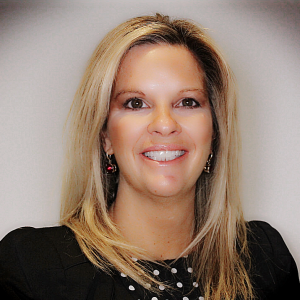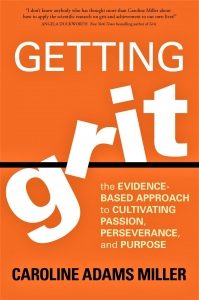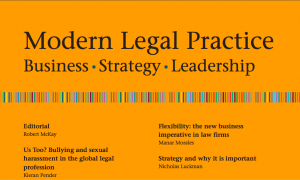Our Spotlight on Flex showcases professionals from member organizations who exemplify personal and professional success while working a flexible schedule. Their stories illustrate the long-term benefits that flexible schedules offer to both individuals and organizations.
2019 Spotlights
For September 2019, we are pleased to share insights from Sarah Rodriguez, Partner at Shutts & Bowen (Orlando, FL).
September 2019 Spotlight on Flex
Diversity & Flexibility Alliance: How have you made flexibility a priority and a success with your schedule?
 Sarah Rodriguez: In undergrad, I originally pursued a degree in engineering, but approximately half way through college, I switched to a double-major in business administration and political science. This naturally parlayed into law school, and after graduating in 2009, I had offers to work at several large law firms. But I chose to start working at a boutique construction law firm doing defense work. I spent three-and-a-half years there until a good friend approached me about joining Shutts & Bowen as a lateral associate. As much as I enjoyed working at the boutique law firm, I knew I wanted the exposure to other areas beyond construction law. I joined Shutts in 2013, and I haven’t looked back!
Sarah Rodriguez: In undergrad, I originally pursued a degree in engineering, but approximately half way through college, I switched to a double-major in business administration and political science. This naturally parlayed into law school, and after graduating in 2009, I had offers to work at several large law firms. But I chose to start working at a boutique construction law firm doing defense work. I spent three-and-a-half years there until a good friend approached me about joining Shutts & Bowen as a lateral associate. As much as I enjoyed working at the boutique law firm, I knew I wanted the exposure to other areas beyond construction law. I joined Shutts in 2013, and I haven’t looked back!
While on maternity leave after having my first daughter at the end of 2013, I started to think about flexible schedules. As a young associate, I was billing close to 2500 hours per year, and my husband was also an attorney. I knew our schedules weren’t sustainable with a newborn at home. I wanted to be present for her and attend all the doctor’s appointments, playdates, and see all her major milestones. I spoke with the Managing Partner and Practice Group Leader, and we agreed that I would come back at a 60% reduced hours schedule; I’ve been working reduced hours ever since I came back from my first leave in 2014. The firm has been incredibly supportive and respectful of my schedule. I’m typically in the office every Monday, Tuesday, and Thursday, although I occasionally work from home on Wednesdays and Fridays. I’ve never been pressured to ramp back up to full time, and in fact, I was promoted to partner in January 2019. I was also humbled to be recognized as a Super Lawyer, Rising Star this past year.
To be clear, I am a full time attorney with a reduced billable hours requirement – I’m committed full-time to my clients and cases. To me, there’s no such thing as a “part-time attorney.” But my flexibility allows me to dedicate the time I want to my family and to professional development opportunities such as lunch with clients, client pitches, and networking events – all things needed to advance any legal career.
DFA: How has the firm and/or clients contributed to this?
SR: The firm has been overwhelmingly supportive, and technology makes it easy to respond to clients (both internally and externally) no matter where I am. I still litigate cases, and I make sure I’m as flexible with the firm as it’s been with me. If a matter requires week-long travel, then I adjust my schedule accordingly; if a client needs to meet on a day I’m not in the office, then I adjust my schedule accordingly. The firm has stood behind me and its promise to promote flexible work. In fact, the firm asked me to be part of the Attorney Development Committee, which includes the firm’s mentoring initiative. I was honored to be asked because it’s another testament to how the firm and my colleagues value me and view me as an asset to help guide younger attorneys.
My clients don’t necessarily know I work reduced hours because there’s no need. I have the same work quality, commitment, and responsiveness as if I were billing at 100% and in the office every day. I’ve learned to be more efficient over the past five years of working flex; I have a better understanding of what constitutes a real emergency, what needs an immediate answer, and what can wait with a realistic response time. My work speaks for itself, and clients are happy if they see the results they hoped for.
DFA: How has working flexibly made your career more sustainable and contributed to business development opportunities?
SR: Flex plays a big part in making my career sustainable. Being able to leave the office at 5 pm to attend a networking event and meet clients – these types of things have always been important to me. Strong, soft skills are what help you develop professionally and thrive. I don’t have to worry about billing enough hours; my focus has always been on the quality of work and client satisfaction. I just think this is a healthier way to practice law.
DFA: Looking back, would you do anything differently, or what would you tell your first year associate self?
SR: I would tell my younger self to focus on building your brand, your work product, your efficiency, and your work relationships. It’s a learning process, but by developing these skills and habits, you’ll have so much more control over your career.
DFA: How do you recharge, and how do you pay it forward?
SR: I have a five year old, a three year old, and twins on the way, so there’s not a lot of free time to “recharge!” But being with my family does recharge me, and I try to make the most of the time I spend with them. We try to take time to read together, play together, and take as many mini-vacations as possible.
I “pay it forward” by providing mentorship, something I’ve valued so much in my career to date. I’m part of the firm’s mentoring program and have served as a mentor through various local bar associations. I enjoy sharing my experiences on how important it is to know your goals and how to achieve them. It’s not always easy to do, but I’m always willing to help others navigate a complicated career path.

 Sarah Rodriguez: In undergrad, I originally pursued a degree in engineering, but approximately half way through college, I switched to a double-major in business administration and political science. This naturally parlayed into law school, and after graduating in 2009, I had offers to work at several large law firms. But I chose to start working at a boutique construction law firm doing defense work. I spent three-and-a-half years there until a good friend approached me about joining Shutts & Bowen as a lateral associate. As much as I enjoyed working at the boutique law firm, I knew I wanted the exposure to other areas beyond construction law. I joined Shutts in 2013, and I haven’t looked back!
Sarah Rodriguez: In undergrad, I originally pursued a degree in engineering, but approximately half way through college, I switched to a double-major in business administration and political science. This naturally parlayed into law school, and after graduating in 2009, I had offers to work at several large law firms. But I chose to start working at a boutique construction law firm doing defense work. I spent three-and-a-half years there until a good friend approached me about joining Shutts & Bowen as a lateral associate. As much as I enjoyed working at the boutique law firm, I knew I wanted the exposure to other areas beyond construction law. I joined Shutts in 2013, and I haven’t looked back!


 This week’s “Getting To Know Our Conference Speakers” post highlights Lily Zheng, D&I Consultant and Co-Author, Gender Ambiguity in the Workplace. Lily will share Lessons in Inclusion as part of our new “Meet The Influencers” program at the conference. You don’t want to miss it!
This week’s “Getting To Know Our Conference Speakers” post highlights Lily Zheng, D&I Consultant and Co-Author, Gender Ambiguity in the Workplace. Lily will share Lessons in Inclusion as part of our new “Meet The Influencers” program at the conference. You don’t want to miss it!